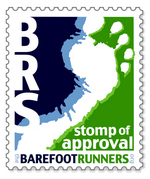As a member of the Barefoot Running board on the Runners World forums I get the honor of helping direct runners new to barefoot running, minimalist running, and running in general. There seem to be lots of misconceptions regarding barefoot running, so hopefully I can help to clear some of these nonsensicle notions for those of you who are interested in coverting to barefoot running or have never ran before period.
False thought #1
Modern surfaces (Ie concrete, cement, asphalt, ect...) arent natural and are too hard to run on barefoot, so I should start on grass or dirt.
Truth
The harder surfaces are ideal for learning how to run barefoot.
The whole concept / reason for running barefoot is to A) improve form and B) strengthen unused muscles in the feet and lower legs. So for this misconception we will focus on the form perspective.
Running in conventional marshmallow overly cushioned running shoes allows the use of poor form. The extra padding absorbs impact and kills the feedback that your body needs in order to react accordingly. This allows you to reach out way in front of your center of gravity with your legs and land on your heels with your legs typically straight. This has several negative side effects. Lots of the impact forces generated by landing infront of your center of gravity and sent through your body, this is primarially felt in the joints. Hence why lots of people dont enjoy runnig because its too "jarring" and hurts their joints. This also halts your momentum and slows you down, thus killing your effenciency and causing you to tire out quicker.
Running on grass, dirt, sand, or any other soft and forgiving surfaces allow you to mimic the same actions mentioned above. These surfaces allow sloppy form and dont really do anything to improve your form, so its somewhat pointless.
Now if you were to remove these cushionings from under your feet and continue running in this manner it would hurt and you wouldnt make it more than 5 or 6 strides before you started to make corrections. This is why hard surfaces are best to start on, they do not allow for sloppy form. When you have to rely on your bodys natural ability to absorb impact your body will start to make the necessary adjustments almost instantly without you even noticing. Your feet will make contact with the ground either directly under your center of gravity, or just a tad bit ahead of it so your not working against yourself by creating a braking effect. Your knees will bend them selves a little so that the impact generated is absorbed via muscles like the quads and calves instead of your joints. Your shorter stride will result in an increased cadence to maintain your speed. And you wont be landing directly on your heels anymore. Instead it should be a more midfoot to forefoot landing to allow your calves and achillies to absord the impact.
So the truth is that soft surfaces will hide faults. When learning how to run Barefoot, the harder surfaces will give you honest feedback.
Falsity #2)
The ground is covered in glass shards, nails, bits if sharp metal, poop, rocks, and hypodermic needles. Im sure to step on something and cut my foot wide open and bleed to death, or at least surely get a bad infection and / or virus.
Truth)
Yes. This stuff is out there, no denying that. Luckily your just barefoot, not blind.... Over the last 8 months of my barefootedness Ive never cut my foot open, and Ive only seen 2 cases where someone has.
I will admit that I have stepped in some gross things. The worst of which was a freshly ran over Opossum. I stepped right smack dab in the brains. I imagine if I ever step in a bowl of warm jello it would be very similiar. Ive also stepped in lots of poopy of various type, mainly bird poop. Yet Im still here!
Falsity #3)
Your feet will become nothing but a giant calluses.
Truth)
Not so. When I used to run shod my feet were giant calluses, now their nice and smooth and leathery, much like the palms of my hands but thicker. There is a slight amount of abrasion and friction that tale place while running bare, and that removes most of the dead skin cells and builds up the plantar skin. Think of each step as a minature pedicure!
Falsity #4)
I need to slowly transition from my conventional marshmallow running shoes, to a reduced running shoe, then to a minimalist shoe, then finally barefoot.
Truth)
You dont have to.
You can do this if you like, theres nothing "wrong" with it. Its just sort of pointless and costly. If you want to run barefoot, then you dont need shoes. Hence it being called "Barefoot".
Falsity #5)
Man hasnt evolved to run barefoot.
Truth)
What? Really? So the thousands upon thousands of years before shoes man never once ran anywhere? It wasnt untill the invention of shoes that man realized he could move faster than a walk? Really? This idea boggles my mind. How can the last 40 years of marshmallow shoes erase the thousands of years of evolution before it? And if man wasnt intended to run barefoot, then how can myself and hundreds of other people do it every day with no issues?
Hopefully this has cleared up some confusion for someone out there. I plan to add to this as more comes to mind.

No comments:
Post a Comment